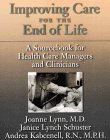National Medicaring Quality Improvement Collaborative (MC-QuIC)
Overview
A Collaborative brings together health care organizations that share a commitment to making major, rapid changes that produce breakthrough results: improved, sustained care arrangements.
This collaborative is for you if your organization wants to:
- Improve quality of life for individuals living with serious illness
- Decrease hospital length of stay
- Enhance use of hospice
- Meet JCAHO requirements for pain relief
- Build new palliative care programs
- Learn and apply quality improvement methods to a real problem
Does your organization want to contribute to the future of health care -- and relieve suffering right now? Virtually everyone eventually lives with very serious illness and disability, for a few years before death. The current health care system is especially ill suited to serving this part of life. You and your team could be part of the solution! If your patients, Board, or leadership are concerned with the persistent shortcomings with this population, here's your chance to join a proven process that works -- and spread good continuous quality improvement practices at the same time. Working together with other teams to improve quality can help you meet JCAHO requirements, improve performance on hospital or nursing home comparison guides, and build palliative care programs. Use this opportunity to bring your organization in line with the national priorities set by Institute of Medicine and the Medicare program related to:
- Pain in advanced cancer
- Care for advanced heart failure
- Pain in nursing homes
- Pressure ulcers in nursing homes
Led by Joanne Lynn, MD, The Washington Home Center for Palliative Care Studies (CPCS) has worked with more than one hundred health care organizations, helping them implement effective quality improvement projects in care for serious chronic illness toward the end of life. With the Institute for Healthcare Improvement (IHI), the CPCS has supported successful national and regional Quality Improvement Collaboratives in which participating teams dramatically improved the quality of care for the populations they serve. Together, we can create the care system of the future -- we can build the care to count on when you need it most!
The cumulative stories and insights
 from this work are published in journals and in an authoritative book, "Improving Care at the End of Life: A Sourcebook for Clinicians and Managers." from this work are published in journals and in an authoritative book, "Improving Care at the End of Life: A Sourcebook for Clinicians and Managers."
Breakthrough improvements achieved in past CPCS-led Collaboratives include:
- 60% reduction in patients with pain greater than 5 on a 10-point scale
- 50% or greater decrease in exacerbations in heart or lung failure
- 90% or greater rates of documented discussion and planning in advance of emergency or incompetence
- Substantial increases in hospice length of stay
- Substantial decline in use of artificial feeding in advanced dementia
Who Should Participate?
Any health care organization such as nursing homes, hospices, home health care agencies, hospitals and health care systems that are looking to improve the quality in issues related to care for persons who live with serious chronic conditions.
What You'll Gain
- Hands-on experience in developing aims, measures and possible changes for improving care and in implementing changes in your practice setting
- An exciting and committed group of colleagues, all aiming to help one another fix serious problems in health care
- A knowledgeable expert faculty, ready to provide content expertise and coach teams on the improvement process
Enrollment Information
Benefits for participants of the Collaborative include:
- Three 2-day meetings (Learning Sessions) over the course of ten months.
- New teams get introduction to the Rapid Cycle Quality Improvement (RCQI) model and training in the initiation of quality improvement action.
- Established teams focus on reinforcing quality improvement activities, updates and in-depth analysis of current quality improvement policy issues.
- All teams work together on insights about improvement organized around patient care topics and change strategies and challenges.
- All teams get ongoing coaching, support and technical assistance via telephone, e-mail, and state of the art Internet communication.
- Please call Ekta Chaudhry at 202-895-2634 for information regarding the enrollment fee.
|
Want to Learn More?
Call Ekta Chaudhry, Director of the Collaborative, at 202-895-2634, or email [email protected].
You may print out and return to us an application form.
Read the FAQ for this collaborative.
Visit IHI to learn about other IHI collaboratives.
|
Upcoming Events
Learning Session, October 21-22, 2004
|
| Collaborative Leadership |

Joanne Lynn, M.D
Director, The Washington Home Center for Palliative Care Studies (CPCS);
President, Americans for Better Care of the Dying |
Anne Wilkinson, PhD
Senior Health Policy Analyst, RAND Corporation;
Director of Research,
The Washington Home Center for Palliative Care Studies
|
Sarah Myers, MPH
Collaborative Consultant,
RAND Center to Improve Care of the Dying
|
Linda E. Noyes, PhD, RN
Director of Community Programs,
The Washington Home Center for Palliative Care Studies
|
|
These Faculty support this Collaborative and will be sharing their insights with teams on conference calls or at learning sessions:
Diane E. Meier, Director of Center of Advanced Palliative Care; Perry G. Fine, National Medical Director, Vista Care; Margaret L. Campbell, Nurse Manager, Palliative Care and Clinical Ethics; Mark J. Kator, President and CEO Isabella Geriatric Center, New York.
|
|



